At the Woodbine Race Track in Toronto works an exercise rider who wears two hats.
By day, April LeBlanc gallops Thoroughbreds for trainers who shoot for big winnings; by night, she re-homes equines who didn’t earn very well as racehorse, but who pay dividends in other ways.
With her careful oversight and training, many become gentle school horses for students as young as nine. Competing for and winning ribbons as hunter/jumpers and eventers, they prove their worth. And in spite of an often underserved reputation as being ‘flighty’ or ‘hot,’ these Thoroughbreds are often the most cool-headed and lovable creatures in the barn.
“I definitely think just about everyone can ride a Thoroughbred,” LeBlanc says. “I have a nine-year-old student learning to jump on an eight-year-old Thoroughbred who raced and later became an outrider pony.
“He’s not particularly talented, and he’s not very fancy over fences. But he’s trustworthy and he’s sweet.”
When trying to identify a salable ex-racehorse to retrain for an appropriate new owner, LeBlanc says that temperament is one of the key ingredients. And so far, in the five years she has been re-homing in earnest, she has moved 18 racehorses, and even has a small waiting list of prospective buyers.
“I have had nothing but beautiful luck with my Thoroughbreds,” she says. “I’ve got two people who are just dying for a horse right now, but unfortunately, every time I go to check out a new prospect, the horse is already sold.”
In the Toronto area, people are snapping up Thoroughbreds. She reports the breed is doing well in the show circuits, and their lower price tag makes them a more economical choice than Warmbloods.
“I think the recession isn’t supporting expensive Warmblood sales like it was,” she says. “
No matter the reason for the decision to buy a Thoroughbred over a Warmblood, LeBlanc is glad to have the chance to help others see in these horses what she has seen for years.
“I like to remind people that just because they raced doesn’t mean they’re flighty. These horses have been walked between parked cars, and can be ridden on a road. They do four flying lead changes everyday after they come out of the starting gate,” she says. On top of which, she adds, that they have been handled so much, and been exposed to a lot of stimulation, that many are just unflappable.
“I was coming off the track on one horse and all he wanted to do was graze and hang around,” she says. “Horses like these are just not very concerned with things that would concern other horses.”
An exercise rider for many years, LeBlanc purchased her first off-track Thoroughbred 15 years ago. East Coast Ellie was a slow racehorse with a people-friendly nature when LeBlanc helped her became a successful, competitive hunter/jumper.
“That horse was a real turning point for me.”
LeBlanc went onto build up a riding lesson business on her property Shadowy Hills Farm, and now all but one lesson horse is an ex-racehorse Thoroughbred.
“I do explain that I’m using retired racehorses and it’s worked out great,” she says. “A lot of little kids have fun finding out their horses’ history and comparing notes on things like winnings and races.”
Keenly aware of the slaughter issue since she she was young, when her parents purchased a Standardbred bound for the meatpacking plant, LeBlanc always has an eye out for a new assignment for a luckless racehorse.
“He was emaciated when we got him. We didn’t know if he’d make it on the trailer ride home. But he turned out to be a wonderful lesson horse, and did really well in the show ring.”
Ellie, on the other hand, was in excellent physical condition when LeBlanc purchased her, but was just too slow on the track.
Giving her a chance to do something else opened doors for both horse and owner, seeding LeBlanc a successful Thoroughbred-focused stable and helping build the positive buzz about racehorse potential.
“Ellie could handle everything we put in front of her. And I’ve had so many special Thoroughbreds since,” she says. “It just shows that some of the most terrible racehorses can go on to become fantastic show horses.”
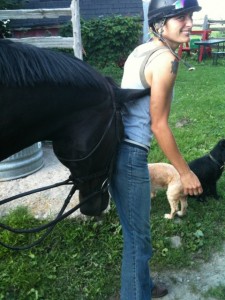
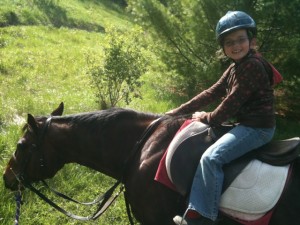
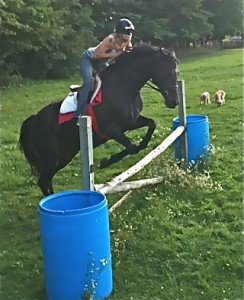

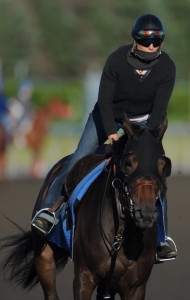

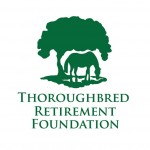
Do you ever take young horses/ yearlings turning two?
This reply is a little late, but I have her e-mail address, she is my coach if you would like her information.
I love this article! What a positive message and congratulations to Ms. Leblanc for her entrepreneurship and caring!
Pam,
Thanks for writing, and I agree. April is making it happen for these horses, but at the same time, she’s built a business to retrain the horses, and introduce lesson riders to OTTBs. It’s brilliant!